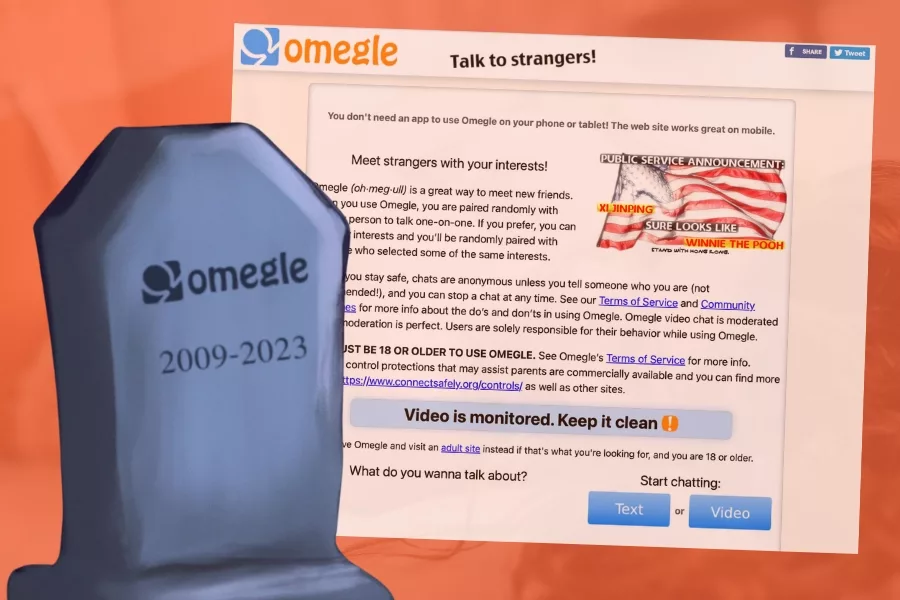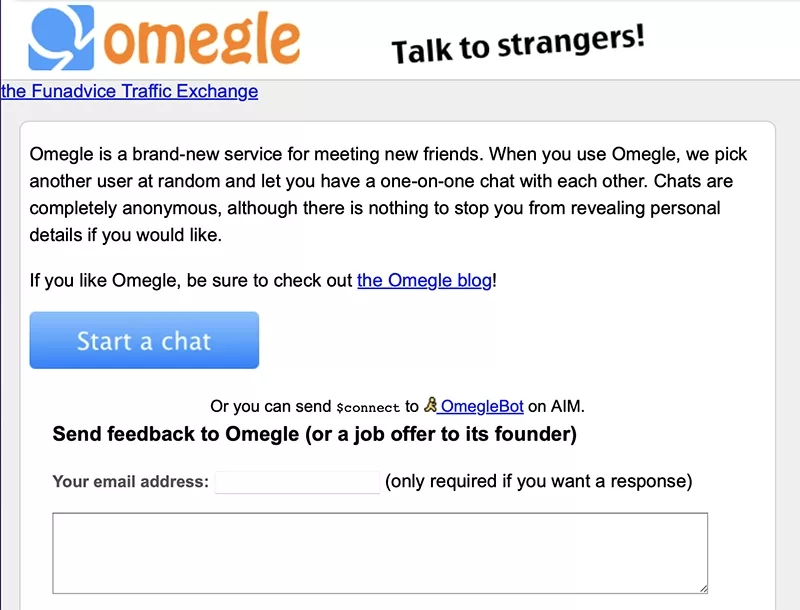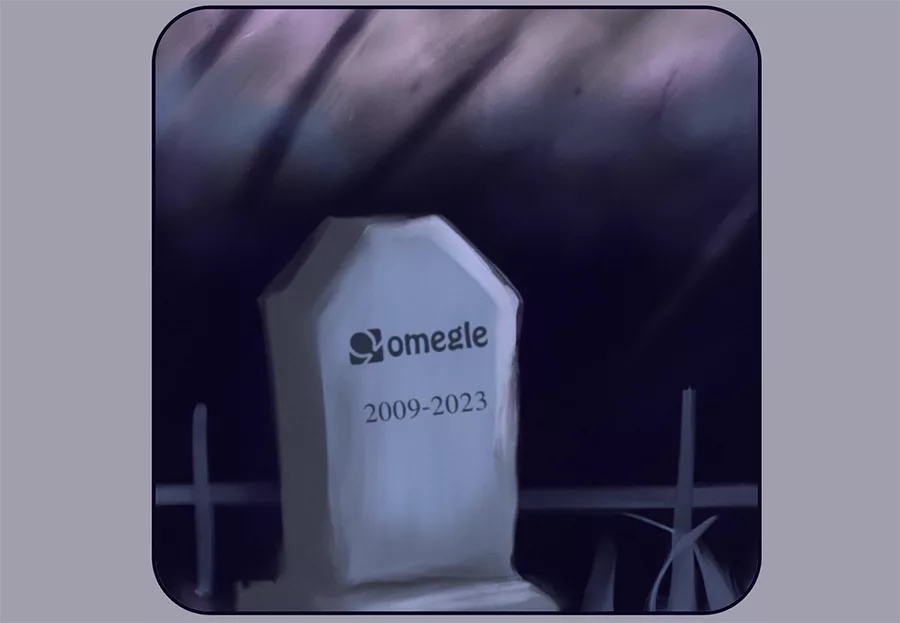
By CamsRank
April 7, 2024
When Omegle was first launched in 2009, it was simply a way for people to communicate with each other on the Internet. Unfortunately, during its 14-year reign, Omegle was wrapped up in countless scandals in several countries and had direct ties to 50+ cases involving paedophilia.
Before Omegle went the way of the dodo in November 2023, the site’s founder, Leif K-Brooks, thanked long-time members for using his platform responsibly. He cited the upside of Omegle: helping users battle against isolation and experience different cultures.
However, the sheer weight of controversy following Omegle was too hot to handle. Leif weighed out the pros and cons before deciding to remove his platform from the running.
(It won't surprise you to learn there are plenty of Omegle copy-cats ready to take its place.)
Now that it’s gone forever, will Omegle be missed?
If there's one thing we've learned about chat roulette sites, it's that you normally don't have to wait long for the next one to come around.
The Rise, Fall and Rise Again of Free Anon Video Chat
Omegle launched in March 2009 as a “virtual chat room” allowing users to bond with each other based on common interests (tags). However, the site’s defining feature was its randomization of voice chats and messaging.
With one click, you could be talking with someone across the globe. Or sharing a video call with a complete stranger.
Leif discovered the Internet at a young age and quickly fell in love with learning more about the broader world around him. Having grown up in a small town isolated from larger society, Leif’s cure for loneliness and sadness was conversing with random people about random subjects.
He comments, “In short, the Internet opened the door to a much larger, more diverse, and more vibrant world than I would have otherwise been able to experience.”
When Leif wasn’t busy making new friends online, he spent his time contributing to open-source projects, editing Wikipedia entries, and even answering computer programming questions from his (older) peers on sites like GitHub. Eventually he was inspired to create his own community, which would come to be known as Omegle.
Leif launched Omegle when he was 18 years old. Initially, he didn’t think much of its potential from a monetary standpoint. Instead, Omegle was simply a passion project released by some dorky nerd living in his parents’ basement in Vermont – or so he first believed!

The novel, one-to-one video chatting site gained organic traffic in a short time frame. It enjoyed a sharp rise to popularity almost immediately, peaking over a decade ago in 2013 and reaching an all-time low in 2018 before making an unexpected resurgence during the COVID pandemic.
COVID lockdowns led many Internet users to come full-circle. We were once again intrigued by the unknown, which sparked a revitalized societal interest in using Omegle.
It was truly free to use and anonymous with no account, sign-up or debit card required.
Omegle was most popular in the US, the UK, India, and Mexico during its heyday. Thousands of people were connected with a new face every minute, and thousands more started chatting with random users by the second. Millions upon millions of people were on Omegle every single day.
Even though Omegle has a minimum age rating of 13 years old including parental permission, without parental permission, all users “must” be 18+ years of age. Unfortunately, there was no way to verify the age of anybody using the platform, leading to child pornography run rampant.
The Omegle Problem: "Please Be Careful of Predators"
Omegle implemented age filters and other restrictions designed to stop predators from speaking with children, adolescents & teens, but they weren’t nearly enough to save the platform.
Instead, it felt like more of a last-ditch effort to fight cyber crime.
Unfortunately, the risk of sharing or viewing inappropriate content was still very prevalent, even after Omegle finally got serious about safety. This boiled down to Omegle issuing their users a front-page warning that, “predators have been known to use Omegle, so please be careful.”
There was also a “monitored” video section that purported to accommodate minors in the 13-18 age range with supervised, moderated chats about SFW topics like roller coasters, politics, Star Wars, or anything else you can think of.
However, the unmoderated section was just a tap away.
People tend to show their true colors when they believe they’re operating under the guise of full anonymity. However, tech-savvy predators were able to bring their cyber-crimes to reality using a web extension known as Chromegle (it grabs the IP address of the user you’re speaking with).
Additionally, predators have been known to secretly screen-record their interactions with minors online and sell whatever footage they can get for money. Omegle had plenty of vigilante justice types, too. Many vigilantes were doing their best to fight against pedophilia, but other users just posed as vigilantes to create content with unwitting Omegle users being framed for paedophilia.
The second Omegle’s novelty began to wear off, people began seeing the huge downsides of randomly chatting with strangers. It’s since been reviled by parents and legal guardians alike as a website that harbored predators, sex traffickers, racists, and other unsavory characters.
It’s not fair to demonize Omegle fully, but they needed to be more proactive about child safety. That ship has since sailed, and its founder elected to shut Omegle down for good in November 2023.
Writing On The Wall
Founder Leif K-Brooks announced the end of an era when they shut down Omegle, citing that the platform was neither “financially nor psychologically” worth sustaining. And who can blame him?
Unfortunately, the site was getting hit with DDOS attacks & swarmed by malicious users.
Leif cites the increasing polarity of society and our collective inability to recognize the common good as two reasons why these attacks were constant and unbeatable. Many of the people who sent out DDOS attacks were those who disagreed with Leif’s “unsupervised” version of Omegle.
They wanted him to either shut down the site entirely or adhere to seemingly impossible content moderation standards. With his back pressed up against the wall, Leif didn’t have many options.
As a survivor of child sexual abuse himself, Leif couldn’t stomach the human cost of maintaining Omegle. He argues that Omegle wasn’t bad on principle, saying that “people have used Omegle to explore foreign cultures, to get advice about their lives from impartial third parties, and to help alleviate feelings of loneliness and isolation.”
He even says that people have gotten married after meeting on Omegle, making a strong case that the platform can be used to improve people’s lives. However, he acknowledges that “the fight against crime isn’t one that can ever truly be won.”
In this way, Leif highlights the innate flexibility of Omegle (and other communication tools) to be used for good or evil. Like kitchen knives and hunting rifles, it depends on who’s using the tool.
Addressing the elephant in the room, Leif further comments that “there are people rotting behind bars right now thanks in part to evidence that Omegle proactively collected against them, and tipped the authorities off to.” Leif cooperated with police and did his part to prevent predation.
In an open letter that he posted directly to Omegle’s homepage, Leif says that “there can be no honest accounting of Omegle without acknowledging that some people misused it, including to commit unspeakably heinous crimes.”
Even though he intended for Omegle to simply be a place where people could interact with one another anonymously, he could never imagine that his pride and joy would turn into the bane of his existence. Operating Omegle was no longer sustainable for Leif and his team of moderators.
He summarizes his long letter by saying, “Frankly, I don’t want to have a heart attack in my 30s.”

The Final Straw in Leif’s Decision to Shut Down Omegle?
The final nail in Omegle’s coffin came in the form of a lawsuit levied by A.M. This is simply a pseudonym for the 11-year-old minor involved in the case. The suit alleges that Omegle paired A.M. with Ryan Scott Fordyce (also known as the “Omegle Predator”) in 2014.
The plaintiff’s attorney, Carrie Goldberg, made no bones about it – in the first line of the lawsuit’s preliminary statement, she clarifies that “this is a product liability case against a company that profits from procuring children for sexual predators.”
We don’t know if we’d go that far, but she certainly gets across the message that Omegle really dropped the ball in terms of content moderation, safety, and easily implementable software that could prevent young children and teenagers from being able to access Omegle in the first place.
Ryan Scott Fordyce was in his late 30s at the time he sexually abused A.M. From 2014 to 2017, the Omegle Predator forced A.M. to send him nude photos & videos, record herself engaging in sex acts of his choice, perform for him & his friends, and even recruit other children on Omegle.
In January 2018, police raided the home of Ryan Scott Fordyce. 3,000+ files containing child pornography were found on his devices. 220 photos & videos included A.M. He was sentenced to eight and a half years in prison for “Internet luring” and the distribution of child pornography.
A.M. later sued Omegle based on her abuse at the hands of Scott, which the suit alleges would never have happened if Omegle didn’t pair her with a man in his late 30’s. Leif tried to have this lawsuit taken care of in 2021, but a judge denied the motion based on Omegle’s product design.
In other words, the $22 million lawsuit wasn’t really about what happened to A.M. at the hands of her abuser in 2014.
Rather, it was about the fact that Omegle made it easy for predators to target children by pairing minors with adults for what amounted to little more than a Skype call.
Additionally, the lawsuit focused on Omegle’s ease-of-access, which is also (surprise, surprise) by design. The entire point of Omegle’s existence was to provide a meeting place for strangers, and users were never made to reveal any personal details, such as name or email address
We found a quote in this lawsuit that captures the problem of Omegle’s existence.
“Omegle knows kids use its product and allows kids as young as 13 to do so despite there being an extraordinarily high probability that within just a couple matches, a child is likely to be face to face with a masturbating adult.” Disabling Omegle forever was a condition of settling the lawsuit.
As such, Leif recognized that he was fighting a losing battle where his ideals paled in contrast to the real-world damage enabled by the principles of freedom and anonymity upon which Omegle was built.
In his words, “what is right doesn’t always prevail,” and this is a prime example of that.
The Reaction to Omegle Shutting Down
People’s reactions to Omegle’s downfall were…a mixed bag, to say the least. Some were finally relieved at the platform’s demise, while introverts mourned the loss of a place they used to fulfill their desire for human connection without leaving the house.
Signy Arnason, associate executive director of the Canadian Centre for Child Protection, told CBC News that Omegle’s closure was long overdue, and it should not have taken litigation to bring it down. Rather, she believes that Omegle shouldn’t have been launched to begin with.
“In the offline world, [we don’t let] kids randomly connect with adult strangers,” she said, yet, “we’ve completely abandoned those principles online.” You can boo her, but she’s not wrong. Look at the current state of the camming industry -- the era of age verification is upon us.
She finalized her statement by saying, “We’ve got to be asking ourselves some bigger questions about how…we’ve offered up this almost haven for offenders to go after kids in such a predatory way.”
Pedophiles using the dark web expressed their “sadness and depression over losing Omegle” while speculating what to use as a replacement for locating vulnerable children on the Internet. One person even said that Omegle’s shutdown interrupted his convo with an 11-year-old minor.
Arnason stressed the importance of imposing strict online regulations to prevent the creation of another Omegle. Taking a look at the bigger picture, it’s clear that countless social media users miss the idea of an unfettered Omegle. After all, it was the go-to sleepover activity in the 2010s.
The hashtag #RIPOmegle was trending on Twitter, TikTok, Instagram, Reddit, and other social media platforms for weeks after Leif announced the shutdown. 840 posts with the hashtag have been published to TikTok, and it has received 22.8+ million views from TikTok users as a whole.
Plenty of popular YouTubers and creators also poured out their condolences for the situation at hand. Penguinz0 and iShowSpeed are just a few of the big-name influencers who’ve reacted to Omegle’s closure.
Some YouTubers made content by transcribing Reddit threads;about the site.
Other creators who presumably built their entire following based around playing Chris Hansen and copying NBC Dateline’s “To Catch A Predator” style of content had to make the switch to random video chat sites like EmeraldChat and ChatRoulette to source material for new videos.
How Does Leif Feel About Eradicating His Flagship Idea From Existence?
And finally, how complex are Leif’s feelings towards permanently shutting down the platform?
Even though he is sure to acknowledge the human cost Omegle has forced child sexual abuse victims to pay, Leif seems more focused on his own philosophy than what’s happening in reality. He puts together several strawmans strung together by faulty logic and presupposed conditions.
While he attempts to defend Omegle’s actions, he wins an Olympic gold medal for long-jumping to conclusions. “A physical-world analogy might be shutting down Central Park because crime occurs there, or perhaps more provocatively, destroying the universe because it contains evil.”
In another dubiously constructed argument, he attempts to make a point but gets lost somewhere in the middle. “If society robs women of their rights to bodily autonomy and self-expression based on the actions of rapists – even if it does so with the best intentions in the world – then society is practically doing the work of rapists for them.”
He goes on to cite society’s unhealthy fear of Omegle and human connection, but his open letter is more of a justification than an apology. He deflects all the blame onto child predators, but Leif forgets to mention that Omegle didn’t have an age verification checkbox until its tenth birthday.
Say what you want about Omegle’s founder, but he sure knows how to pick his quotes.
He takes a subtle dig at the attorney who forced his hand by stealing a page from the revered C.S. Lewis.
“Of all tyrannies, a tyranny sincerely exercised for the good of its victims may be the most oppressive…but those who torment us for our own good will torment us without end, for they do so with the approval of their own conscience.”
In other words, he just described virtue signaling.
What Are Some Popular Video Chat Sites Filling the Vacuum Left Behind?
When Omegle closed fourteen years after its inception, it left behind a massive power vacuum that countless alternative companies have tried to fill.
While some are much better than others, none have reached the degree of mainstream success that Omegle enjoyed during its heyday.
Nonetheless, most random video chat sites learned from Leif’s mistakes.
Some now require Google or Facebook authentication, while others require you to sign up with a working email address.
These can only described as 'baby steps' for the future of chat roulette sites. In reality, the market dictates that the crowd will gravitate towards whichever service offers the biggest clicks and the least red tape.
Some users might miss Omegle, but it won't take long for an alternative to emerge.
How Do You Feel About Omegle’s Retirement?
Much like pineapple on pizza or peanut butter and mayonnaise sandwiches (don’t ask), Omegle is just one of those things you either love or hate with no middle ground.
Depending on who you ask, Omegle is either the cornerstone of their adolescence or the source of childhood traumas.
It’s unfortunate, but sometimes, terrible platforms can result in good memories (and vice versa).
What do you think about Omegle’s swift and permanent retirement?







Anybody who truly misses Omegle needs to get out more. It was a car crash for years before it closed.
Lame street.